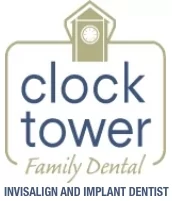
Did you know your dentist can help treat your snoring and sleep apnea with a prescription from your PCP? At Clocktower Family Dental, we do general dentistry, but we also help with several different sleep problems, including snoring and sleep apnea.
Our dental clinic is here to help you, no matter the issue, so our dentistry includes sleep! If you or your family struggle with snoring and sleep apnea, keep reading to learn about what treatment options Clocktower Family Dental can offer you.
What Causes Snoring?
At the most simple level, snoring is caused by air vibrating the soft tissues in your throat. However, many factors affect how likely this is to happen, including:
- Nasal problems like a deviated septum.
- Chronic or seasonal allergies.
- Having a narrow airway.
- Alcohol consumption.
- Being overweight.
- A cold or flu.
- Smoking.
No matter the reason you snore, you can find relief through a variety of treatments, including Invisalign clear braces, NightLase™ therapy, or an oral appliance.
Should I Be Worried About Sleep Apnea?
Sleep apnea of any kind can be concerning. There are many health problems associated with the condition, and it lowers your quality of life. However, you don’t need to worry because Clocktower Family Dental offers sleep apnea treatments that can keep you healthy and happy.
Do I Have Sleep Apnea?
There are a few different types of sleep apnea. The type you have will determine your treatment options.
Obstructive sleep apnea occurs when your tongue or throat tissues relax too much, cutting off your airflow. This blocked airway is what causes you to stop breathing and wake up. Obstructive sleep apnea causes include:
- A narrow airway.
- The lack of room for your tongue in your mouth.
- Too much soft tissue in your throat.
- Jaw position.
Central sleep apnea, on the other hand, is caused when your brain doesn’t send the right signals to your lungs. Central sleep apnea is not usually treated by dentists, but we can refer you to a sleep specialist if needed!
Excessive snoring can sometimes indicate sleep apnea. Other sleep apnea symptoms include:
- Gasping or choking in the night.
- Chronic fatigue during the day.
- Difficulty breathing at night.
- Brain fog during the day.
- Chest pain at night.
- Weight gain.
- Headaches.
- Irritability.
- TMJ pain.
If you have these symptoms, you should do a sleep apnea test to determine if you have sleep apnea and the best treatment for your unique situation.

Health Concerns Related To Snoring and Sleep Apnea
If you show signs of sleep apnea, don’t wait to visit the dentist. There are many health problems associated with the lack of oxygen and disrupted sleep that obstructive sleep apnea causes. Sleep apnea health risks include:
- Stroke.
- Heart disease.
- Heart failure.
- Diabetes.
- Depression and irritability.
Why Visit a Dentist for Snoring and Sleep Apnea Treatment?
A dentist, like our team at Clocktower Family Dental, can work closely with your doctor or sleep specialist to help you sleep and feel better. Your PCP or sleep specialist will likely do a sleep apnea test to determine if you have sleep apnea. Once diagnosed, they will go over treatment options for sleep apnea using a variety of tools, procedures, and appliances to keep your airway clear during sleep.
Sleep Apnea Solutions
A CPAP (continuous positive airway pressure) machine is still considered the gold standard to treat sleep apnea. Although a CPAP machine can be very effective, many can’t wear them. Obstructive sleep apnea treatment doesn’t have to be painful, difficult, or inconvenient. At Clocktower Family Dental, we offer a variety of doctor approved sleep apnea treatment options.
Nasal Breathing Exercises and Decongestants
A great starting place for snoring and sleep apnea is nasal breathing exercises and decongestants. Did you know that sometimes snoring and sleep apnea is worsened by weak nasal passages or chronic congestion? An ENT can evaluate your turbinates and nasal septum to see if they are the cause of the problem. By practicing techniques like Buteyko breathing and breathing through your nose and clearing congestion, you may find that your symptoms ease.
Invisalign® Orthodontics
Another sleep apnea treatment option is Invisalign clear braces. An Invisalign dentist, like our team at Clocktower Family Dental, can fit you with clear aligners. Adjusting your teeth and jaw alignment can keep your throat open at night and make your tongue and throat less likely to block your airway.
NightLase™
A new sleep apnea treatment option is NightLase™ laser therapy. A gentle and easy procedure, NightLase™ uses lasers to stimulate the tissue in your throat, tightening it so that it no longer causes a blocked airway and difficulty breathing at night. This is a much safer and more accurate procedure than airway surgery.
Obstructive Sleep Apnea Oral Device
Another method of sleep apnea airway management is a sleep apnea mouth guard or other oral appliance. A mouth guard, tongue stabilizer, or jaw advancement device helps shift your jaw alignment and keep your tongue in place. These small changes can prevent sleep apnea episodes by preventing your throat tissues or tongue from blocking your airway.
MARPE/MSE
Because one of the main causes of sleep apnea is airway obstruction, one solution can be to widen the airway. To do this, we use either MSE (maxilloskeletal expansion) or MARPE (mini-implant assisted rapid palatal expander) treatment. This procedure is effective in patients whose pallets create narrow airways. The MARPE device widens the upper jaw to make room for airflow.
Call Us Today To Find Out More About Snoring and Sleep Apnea
Don’t wait until it’s too late! Get sleep apnea treatment now and get better sleep tomorrow! Visit Clocktower Family Dental to learn about sleep dentistry and get treatment for your snoring and sleep apnea.

